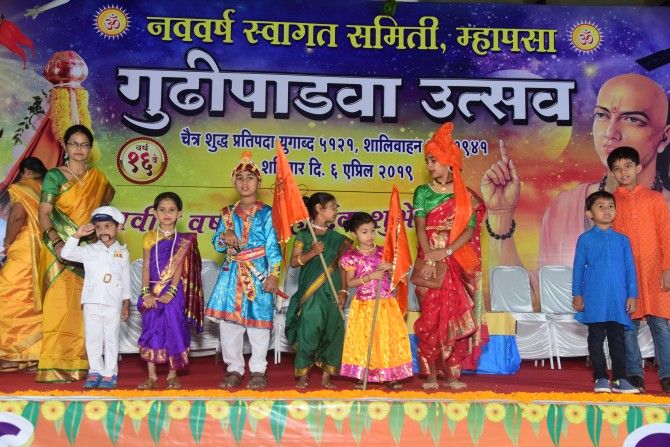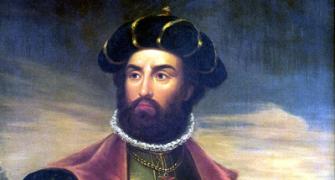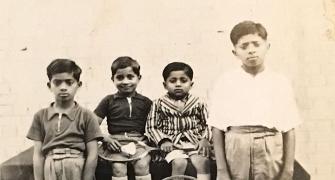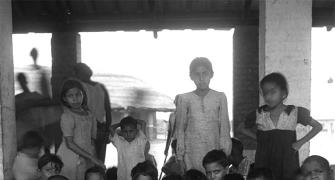'We must not forget who we are and what courage and bravery were shown by our ancestors to bring us closer to the freedom we enjoy today,' says Tarun Vijay after attending the Gudi Padwa in Goa.

Recently a colleague who knew I was flying to Goa asked if there were still any Hindus left in the state!
He believed Goa was the 'Rome of the East' where Christian culture prevails. So much about the Goa carnival, the Basilica of St Xavier and all its connections to Portugal and Christianity has been projected in the media, that few believe that Hindus still form 65 per cent of Goa's population and that temples like Shanta Durga, Mangesh Dev (in Lata Mangeshkar's ancestral village) are visited by millions.
Goa today presents the best example of communal harmony and a wonderful Hindu-Christian amity that is an example to other states. Manohar Parrikar, the late chief minister, was a great symbol of this togetherness.
But to my friend and others like him, Goa is a state with a Portuguese hangover, churches and Western musicals.
It is not.
Memory is the key to understand, unite and power a nation. Such questions and perceptions come from a 'memory-lost' people. This article is for them.
This year, when invited to celebrate the great Goan-Maharashtrian festival of Gudi Padwa, I visited Mapusa, the beautiful town north of Panaji. It was the first day of Navratra and marked the beginning of Vikram Samvat 2076, the Hindu new year announcing the coronation of the legendary emperor Vikramaditya.
I was surprised by and overjoyed at seeing Hindus from various political parties sitting together during an intense election season and remembering the sacrifices of their ancestors to save Hindu Dharma.
Many from the Catholic community too were present as a part of the festivities along with their Hindu brethren and took part in all the celebrations, that required waking up around 4 am to reach the venue.

With unfurling of the gudi, a bhagwa flag, a traditional symbol of Hindu rule, the festivities were inaugurated and the glorious eras of Hindus in various periods were remembered, with Chhatrapati Shivaji getting special mention.
The interesting and ennobling part was that the weaknesses within Hindu society, like caste division and discrimination, were condemned and people asked to show only one identity -- the Hindu one -- surpassing all internal divisions which have become redundant and are eating away at the vitals of society.
This was the 16th year of such a mass celebration; earlier, Gudi Padwa was a personal festival with Hindus tying the gudi atop their homes.
But Goan Hindus felt it was time their children and youth were made aware of their festivals and their significance in the context of the national perspective. Soon, the idea caught the attention of society and it became a massive annual celebration with the town's young women donning saffron headgear and participating in a fantastic motorcycle rally holding saffron flags through the city.
The function began at 5 am and ran till 7.30 am. The speakers recalled the sacrifices of their ancestors to preserve and remain faithful to dharma, that included remembering Guru Tegh Bahadur and Guru Gobind Singh, Bhai Haqiqat Rai, and the glorious regimes of Vikramaditya, Raja Raja Chola, Krishnadeva Raya and Harihar Bukka.

The period under the Portuguese was specially mentioned when Goan Hindus were made to go through the most excruciatingly slow death during the 'inquisition' only because they refused to convert to Christianity.
Though the Portuguese converted many temples into churches and converted a large number of Hindus under coercion, Goans kept alive the Hindu dharma's invincible flame of faith, said Girish Bharne, a high achiever in the field of software engineering.
The story of Sambhaji Maharaj was recounted by the celebration committee's coordinator Sanjeev Walawalkar telling the youth how Aurangzeb tortured him to convert to Islam but he did not yield. The horrifying abduction of Reena and Raveena in present day Pakistan by Islamists and their forceful conversion and marriage was also remembered.
What is the message of such memory rejuvenation while celebrating religious festivals?
The significance is immense -- a nation and its people are dead without memory.
The memory of their ancestors' pains, sorrows, joys, defeats and victories keep society alive and connected to their real identity that had been nursed by thousands of those who dedicated their lives for the preservation of their core identity and faith.
Colonial rulers and invaders have always been the biggest memory erasers the world over. They fear a backlash and societal solidarity against them if memory is allowed to remain alive.
Hence post-Columbus, efforts were taken to have that era's atrocities and savagery suppressed, putting native American Indians into reservations and overwhelming national life with a history written as the new victors saw it and liked it to be taught.
The Portuguese conquistadors in Goa did the same. They made special efforts to erase Hindu memory, prescribed books that taught everything except Hindu legacy, heritage and their glories.
They ruled this tiny Hindu region for 450 years and Goa gained freedom through a lethargic procedure in 1961, 14 years after India had kicked the British out in 1947.
These 450 years of subjugation, inhuman inquisitions, forced conversions, destruction of Hindu temples and brutalities inflicted on Hindu women created a slavery of mind. The native colonised people were trained to learn to respect their tormentors.
The surprising aspect of this mind slavery is that in none of the contemporary Goan school curricula did the savage Portuguese rule and its implications find space, as if nothing happened in the last 450 years.
We must not forget who we are and what courage and bravery were shown by our ancestors to bring us closer to the freedom we enjoy today.
We became instruments of the East India Company's mindset to put hurdles in the path of any effort that aims to have these memories revived, preserved and transferred to the younger generation.
Goa has shown the way through memory rejuvenation for a better future and a corrected present.









